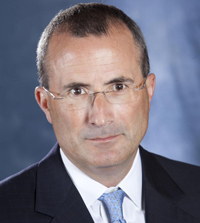Dinner group boosts next generation of association CEOs
Dinner group boosts next generation of association CEOs
- December 8, 2012 |
-
 WILLIAM EHART
WILLIAM EHART

Chamber's David Chavern gathers younger executives, most in their first top jobs, for networking, support, shared experiences
Association CEOs tend to be an older bunch. Many are at or nearing the pinnacle of long careers. The association business was different when they were cutting their teeth.
But there is an emerging generation of younger trade group leaders who have new challenges and must find new paths to success.
Among this group is an informal, invitation-only circle of chief executives who find support, advice and shared experiences with each other. U.S. Chamber of Commerce COO David Chavern quietly assembled the group about two years ago, flying under the media radar until queried by CEO Update.
 |
| David Chavern |
"We're all trying to figure out how to run associations in this rapidly changing environment," Chavern said. "Part of that is trying to figure out what the association business is going to look like 10 or so years from now."
The composition of the group changes over time but it typically has about a dozen members, Chavern said. There is no formal name—some call it the "Young CEOs" or "NextGen" group.
"We call each other young," Chavern laughs—adding that most of the group are in their 40s and in their first association CEO jobs. They meet for dinner at Chamber headquarters every two or three months, most recently Nov. 19, when members discussed the election's economic impact.
Chavern declined to reveal the NextGen group's members, though he said all were part of the Chamber's Association Committee of 100.
Confirming membership
CEO Update has confirmed the names of 10 members:
Kevin Burke, CEO of the $5 million-revenue American Apparel & Footwear Association;
Steve Caldeira, CEO of the $12 million-revenue International Franchise Association;
Linda Bauer Darr, CEO of the $4 million-revenue American Moving & Storage Association;
Mike Gallagher, CEO of the $32 million-revenue Entertainment Software Association;
Richard Hunt, CEO of the $7 million-revenue Consumer Bankers Association;
Michelle Korsmo, CEO of the $6 million-revenue American Land Title Association;
Susan Neely, CEO of the $84 million-revenue American Beverage Association;
Craig Purser, CEO of the $10 million-revenue National Beer Wholesalers Association;
Leigh Ann Pusey, CEO of the $21 million-revenue American Insurance Association; and
Matt Shay, CEO of the $32 million-revenue National Retail Federation.
"Its really tremendous when you can identify that peer who's had the same problem, who's had the same situation and can say, ‘You know, I had that conversation with my executive committee 15 months ago and here's what we did,'" Purser said.
"Sometimes you're doing that with folks who are your marketplace competitors or folks on the other side of you on a particular issue, but there's great value in listening to and learning from others," he said.
"We talk about board issues, we talk about compensation structure, we talk about staff development, programs, conventions and speakers, member services, politics, issues, lobbying
strategies, public relations, there's really nothing off the table," Purser said.
Caldeira said he had met Hunt at one of the dinners, and the encounter led to two small-business lending summits where Hunt's bankers met with Caldeira's members to try to ease credit for the franchise industry.
"I find them an excellent way to foster cross-industry relationships that can sometimes lead to important coalitions," he said.
Gallagher said the events are "a top priority on his calendar," and called Purser "the life of the party," befitting his position as a leader in the beer industry.
"Each of us represents a different industry," said Gallagher. "We all have different perspectives and we all are very immersed in the particular challenges of our industries. This allows us to compare notes on how to do the job of an association CEO and also to meet new challenges with new tools."
Candid conversations
Gallagher said the dinners include frank exchanges of views.
"This is a group that very easily disagrees with each other without being disagreeable," he said. "The conversation is very candid, which of course is of a very high value in this town. People
are pretty quick to call bullshit on one another."
Darr said the Chamber recognized that executives were starting to do business in a new way.
"Folks in their 40s and 50s had come up at a different time, and were starting to apply things like technology and social media," she said.
"We hadn't been able to engage as a group. These are going to be the folks with the white hair sitting around the table 20 years from now. Let's bring them together now."
The NextGen dinners help relieve the isolation that can come with an association CEO job, Darr said.
"I have 4,200 members and they're all in the moving industry," she said. "I'm the only one who's not. In the association industry, it can be a very lonely job if you don't handle it right. I'm surrounded by movers who don't understand the pressure you're under doing your job in the Washington environment."
Neely also said the events are changing peers into friends.
"I think the personal friendships are growing, not exclusively because of the dinners David hosts, but it's just a way to get better-acquainted and that fosters other kinds of networking," she said.
Purser said the get-togethers aid the development of leaders.
"It goes into the ‘practice what you preach' department," he said. "It's great to give your [staff] an opportunity to have some professional development or learn a new skill or bring themselves along professionally. As association CEOs, we have an obligation to do that as well."
